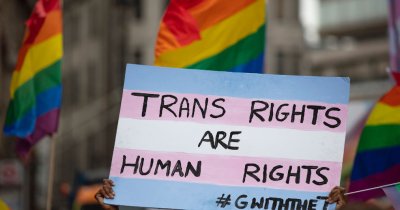Years Later, VA Still Has Still Not Fulfilled Promise to Cover Gender-Affirming Care
Three years after Secretary Denis McDonough promised that the U.S. Department of Veterans Affairs would begin covering gender-affirming surgery, that commitment has still not been met. And as anti-trans legislation continues to sweep the country, transgender veterans say they see the latest delays by VA as further evidence of politically motivated bias against their community.
“The community has done our job, we have served our country, we have earned the benefits that we have through VA; it’s not our fault that Congress and Capitol Hill can’t stop fighting about whether or not we should even be alive,” said Lindsay Church, executive director of Minority Veterans of America. “All we want is access to care.”
McDonough said in 2021 that covering the surgery would correct what he called a “dark history” of discrimination. Implementing a revised policy would take the department two years, he said.

Three years after Secretary Denis McDonough promised that the U.S. Department of Veterans Affairs would begin covering gender-affirming surgery, that commitment has still not been met. Stock photo.
The Transgender American Veterans Association (TAVA) began trying to push VA to cover gender-affirming care in 2016, filing a petition for a rulemaking to force the department to provide coverage. But VA never responded to TAVA’s petition. With transgender veterans still in limbo, TAVA filed a motion in January with the U.S. Court of Appeals for the Federal Circuit in Washington, D.C., asking the court to make VA respond.
On Feb. 22, VA responded and denied TAVA’s 2016 petition, offering no timeline for when the department might make good on McDonough’s promise.
“VA has moved methodically in its consideration of this important potential change in coverage,” VA said in its response, “because it must be implemented in a manner that has been thoroughly considered and ensures that the services made available to veterans meet VA’s rigorous standards for consistent and quality health care nationwide.”
VA also cited the PACT Act, passed by Congress in 2022, as another reason action on transgender care had been delayed. The act greatly expands health care for veterans exposed to toxic substances such as burn pits and Agent Orange and aims to bring many more veterans into VA care. But VA said that because the agency still did not have cost data for the expanded coverage, it was not yet prepared to implement gender-affirming surgery. In a news conference on Feb. 26, McDonough said he was waiting for data about how many veterans were anticipated to be newly eligible for care under the act.
Church called the most recent postponement “just another in the long line of delays that are no fault of transgender veterans.”
Under current rules, VA will pay for in-hospital care if it is intended “to promote health” or if “the care will enhance the quality of life or daily functional level of the veteran.” Under the ban, though, gender-affirming surgery is classified as “gender alteration,” rather than necessary or life-enhancing care, so transgender veterans are not able to access the surgery.
In 2018, the Palm Center, an independent research institute that studied military policy and LGBTQ issues, estimated based on Department of Defense data that there were 14,707 transgender service members—8,980 on active duty and 5,727 in the Selected Reserve. The National Center for Transgender Equality has estimated that there are more than 134,000 transgender veterans.
Since President Joe Biden was elected, however, the administration has shifted the federal government’s approach to transgender issues, expanding protections in educational and health care settings, and promising to expand coverage for veterans.
Church, who uses the pronoun “they,” said they had personally felt the effects of not having access to gender-affirming care through VA.“As a transgender person, I have lived with body parts that never felt like my own, they never felt like I was in my own body,” Church said. “I’ve struggled with things my whole life and never understood why.”
Church said that after complications from surgery for an inverted sternum resulted in damage to their chest implants, they were able to receive gender-affirming surgery to repair the damage—a procedure their surgeon deemed medically necessary.

Runners take off from the starting line of the Pride Month 5k run which takes them through Huffman Prairie at Wright-Patterson Air Force Base, Ohio, in 2021. The run was in celebration of Pride Month, which celebrates members of the LGBTQ community. Photo by Wesley Farnsworth, courtesy of the U.S. Air Force.
“I needed that care to save my own life,” Church added. “Waking up after that surgery, it was as if I was in my body for the very first time. As if I was in the body that I was meant to live in my whole life.”
For veterans who have long waited for care, the consequences of delay can be dire. In TAVA’s January motion to the court, the organization cites an incident where a transgender veteran attempted to perform the surgery on herself because she could not get it through VA.
“Desperate and unable to access gender-confirmation surgery via the VA or alternative means, [the veteran] removed her right testicle at home on March 5, 2022, without anesthesia or formal medical training,” the petition said. “In doing so, she accidentally severed an artery. [She] managed to drive herself to the local emergency room, where she received life-saving care.”
According to a 2019 study published in the journal Perspectives on Psychological Science, transgender service members serve in the military at two to three times the rate of the general adult population. Yet they die by suicide at twice the rate of cisgender veterans and at more than five times the rate of the general population.
Award-Winning Journalism in Your Inbox
Cathy Marcello, assistant director of programs for the Modern Military Association of America, who has 13 years of experience in LGBTQ+ advocacy work, said that gender-affirming surgery is necessary for transgender veterans to receive the best quality of life.
“Gender-affirming surgeries are life-saving care,” Marcello said. “This is recognized by every medical association as life-saving care, and yet there is a blanket ban on those surgeries at the VA.”
“What veteran would be denied life-saving care?” Marcello added.
Not everyone at VA agrees with Marcello’s views. In January, three VA psychologists expressed their disapproval of the agency’s public support of transgender veterans in an opinion piece published by The Hill, citing fears that “single-gender spaces” would violate women’s rights to privacy.

Three years after Secretary Denis McDonough promised that the U.S. Department of Veterans Affairs would begin covering gender-affirming surgery, that commitment has still not been met. Stock photo.
“Humans are a sexually dimorphic species, and this has medical consequences irrelevant to the metaphysical concept of gender identity,” the authors wrote in the opinion piece. “Sex is an immutable biological trait, carrying with it biological and medical consequences that doctors cannot overlook.”
The op-ed sparked controversy over how serious VA was about protecting transgender veterans within its health care system when employees were so outspoken about their dissenting views.
Asked about the op-ed in a January press conference, McDonough said, “We are very serious about ensuring that every veteran feels safe in that environment. So, wherever veterans don’t feel that, we’ll make sure that we address that.”
Our Journalism Depends on Your Support
K.N. McCleary, a law student at Yale University who has worked with TAVA as an intern to find ways to accelerate policy changes within VA, said the eight-year silence from the agency after TAVA filed its initial petition has left many veterans struggling.
“So many TAVA members and other transgender veterans across the U.S. are impacted by not being able to access this care and being forced to go outside of the VA to access it,” McCleary said. “[It’s] disappointing because Sec. McDonough has made so many public commitments to providing this care at the VA.”





Comments are closed.